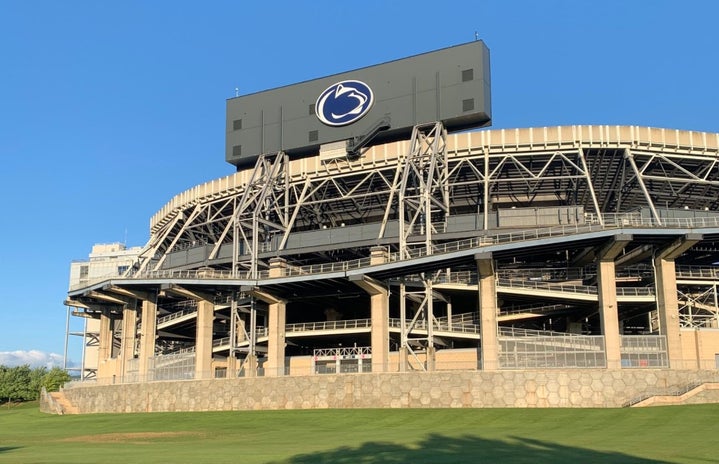For as long as I can remember, Penn State has been my dream school.
Growing up just two and a half hours from the campus, my family and I often made weekend trips to State College to root on the Nittany Lions during college football season. In fact, some of my fondest childhood memories are ones spent outside of Beaver Stadium with my relatives. I remember being absolutely mesmerized by the sea of cars filling the tailgate lots and the loud, chaotic atmosphere that exists on a game day.
Though I’ve never taken much interest in sporting events, I’ve continued to take part in various traditions surrounding the football program. As a senior at Penn State, I’ve begun to wonder: why do I spend hundreds of dollars on student tickets each season if I don’t even like football? What about the experience makes it worth it for me?
Cheering on the team from the stands was something that PSU students had to cope with losing this past season in light of the COVID-19 pandemic. While I’m certainly partial to Penn State, I recognize that a dedicated — and almost cult-like — following of football exists at other large universities across the country, too.
So, why is Penn State’s football following referred to as a cult? What characteristics give other large football schools a similar reputation?
Rooted in tradition
Speaking from my own experience, it was almost as if I had no choice but to become a Penn State fan. I was born into a family whose loyalty to the football program dates back to the 1960s and contains several PSU grads, including my parents, older brother, and a few aunts and uncles.

Although I’m sure my family secretly hoped that I’d end up at Penn State, I didn’t feel an ounce of pressure from them during the application process. The older I got, the more I wanted to be able to relate my own college experiences to the stories that I had always heard older family members tell. Going to Penn State was my way of honoring that unspoken tradition.
Ryan Overstrom, a senior at The Ohio State University, has made similar observations about his college peers. Having earned eight national football titles, Ohio State is ranked as having the third-best program in the country, according to ESPN.
“Most people who go here grew up watching games with their family, so there is an appreciation and love from a young age,” Ryan says. “When a school does that, it tends to gain a massive following.”
The social scene
Once the pandemic is over, the thing I’m looking forward to the most is a return to a normal social life.
Whether it’s the inner party girl in me talking, or simply due to the fact that I don’t care for sports to begin with, my favorite part of game days has always been tailgating with friends beforehand. State College’s rural landscape provides ample space for all of my favorite festivities: drinking outside, playing cornhole, and grilling hot dogs and burgers.

In October 2018, INSIDER published an article containing the top college football tailgates by state. Writer Vinciane Ngomsi described the tailgating experience to be “almost as memorable” as beating a rival for some universities.
I wasn’t surprised to see her piece awarded Penn State the honors, giving Pennsylvania a spot on the list. Other prominent football programs such as The University of Alabama, The University of Michigan, University of South California (USC), and Ohio State earned the title for their respective states as well.
Not all tailgates seem to be created equally, however.
The only time that I’ve ever attended an away college football game and, as a result, experienced another school’s way of tailgating was during my freshman year. I drove nearly seven hours to East Lansing, Michigan in November 2017 to watch Penn State play Michigan State University. Yet once there, the campus reminded me of my own: grassy plots of land covered with spirited, rowdy fans.
When I had the chance to speak with another Ohio State student, junior Mara Rayburg explained that game days look different when celebrated in the state’s capital city, Columbus.
“For the students, before games, different Greek life organizations hold Block,” Mara says, “which is basically a party during the day, before kickoff, at off-campus houses.”
Given her school’s more urban setting, she says that there isn’t as much open space for tailgating when compared to Penn State. Despite this difference, a similarity prevails between the two universities: a cult mentality surrounding tailgate parties that is shared by dedicated students, alumni, and fans.
A shared sense of pride
I uncovered another characteristic that seems to highlight the cult mentality associated with college football: pride.
At Penn State, the first thing that comes to mind when thinking about school spirit is the big rivalry game our football team plays each year in our home stadium, often referred to as the “Whiteout” game.
This occasion typically attracts more than 100,000 spectators that pack the bleachers while dressed in white from head to toe.

Combined with other rituals such as singing the alma mater, chanting “We Are!” and being tossed in the air to celebrate a touchdown, the sense of community and pride (shared even with complete strangers) truly feels unmatched on a game day in Happy Valley.
Similarly, this feeling also exists for Ryan at Ohio State while sitting in the student section at football games.
Even though Ohio State is traditionally thought to be one of Penn State’s rivals — and has been the opponent for numerous Whiteout games — OSU fans seem to enjoy a few of the same experiences. Ryan says that students and other fans alike join together to sing their alma mater, “Carmen Ohio,” throw tailgate parties, and express a relentless hatred toward rival schools, such as The University of Michigan.
“OSU brings everyone in Columbus together,” Ryan says. “It’s like one big family that transcends any differences.”
Our rivalry aside, I couldn’t agree more with Ryan.
Over the past four years of undergrad, I’ve met people of all races, religions, states, and even countries. This has made my time at a large university so special and valuable, mainly because I likely wouldn’t have had diverse experiences if I remained in my small, rural hometown forever. Among the differences in culture and interests here at Penn State, students seem to find a common ground in cherishing the tradition, social aspect, and school spirit that comes each fall football season.
Even for those (like myself) who may not necessarily cheer for sports, game weekends serve as a chance to celebrate friendships and make lasting memories. To answer my own question, I’ve realized that this is how I’ve justified spending so much money on season tickets throughout the years.
No matter how invested spectators might actually be in the sport, a persistent desire to take part in such a large, thrilling game and fandom gives meaning to the “cult” in college football’s culture.


